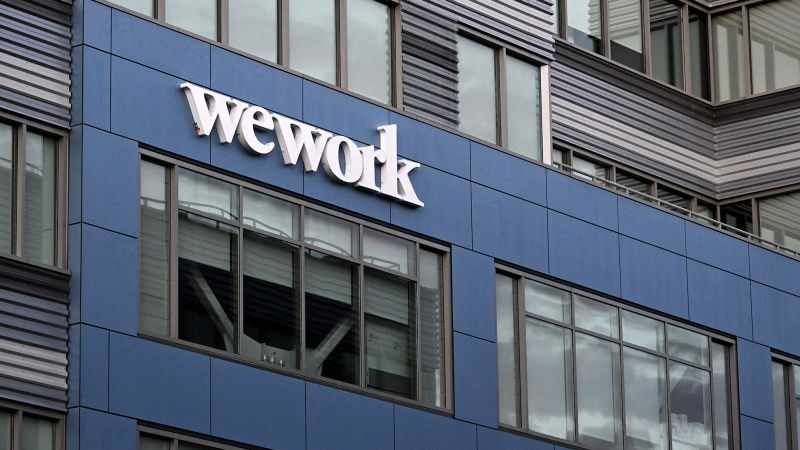WeWork is now planning to file for bankruptcy. The company’s rise and fall have been marred by a series of missteps, financial troubles, and the global pandemic.

Also Read: HSBC Announces $3 Billion Buyback, CEO Touts Capital Strength
WeWork began in 2010 when entrepreneur Adam Neumann co-founded the company with the vision of revolutionizing the way people work.
The concept was simple yet compelling, provide co-working spaces that needs of a modern workforce, offering flexibility and community to freelancers, startups, and established businesses.
WeWork’s success lay in its ability to tap into the growing demand for shared office spaces in a world increasingly focused on collaboration, connectivity, and flexibility.
The company quickly garnered the attention of investors, raising billions of dollars in funding and achieving a valuation of $47 billion by 2019.
WeWork’s expansion saw it become one of the most valuable startups in the United States, with locations in major cities worldwide.
WeWork’s ambitions didn’t stop at revolutionizing office spaces; it aspired to become a publicly-traded company.
In preparation for its initial public offering (IPO), the company filed the necessary paperwork in August 2019. However, what was expected to be a triumphant moment for the company turned into a fiasco.
Investors and analysts scrutinized WeWork’s financials, revealing massive losses, a complex corporate structure, and a growing pile of debt.
The company’s financials painted a picture of profligacy, with lavish spending on office design, executive salaries, and expansion that outpaced revenue growth.
Also Read: Elon Musk Offers Wikipedia $1 Billion to Change its Name to Dickipedia
As concerns mounted, WeWork’s IPO faced skepticism from investors. Just a week before the planned IPO, co-founder Adam Neumann stepped down as CEO, acknowledging that his leadership had become a distraction. WeWork’s IPO was shelved, marking a catastrophic failure and a blow to its valuation.
As WeWork fought with the aftermath of the failed IPO, a new challenge emerged in the form of the COVID-19 pandemic.
The sudden shift to remote work and lockdowns imposed by governments worldwide had an impact on the demand for shared office spaces.
Many businesses, facing economic uncertainty, looked to cut costs, and for some, relinquishing their WeWork leases became an attractive option.
WeWork, reliant on long-term leases and subletting spaces on a short-term basis, faced a wave of cancellations and tenant exits.
The company was further exposed to public criticism as tenants sought ways to escape their leases, which were often rigid and unforgiving.
The pandemic accelerated the remote work revolution, leaving WeWork with a surplus of office spaces and a dwindling customer base.
WeWork continued to operate, but not without adjustments. The company began selling off ancillary businesses, cutting jobs, and canceling or modifying hundreds of leases to stem its losses. WeWork’s leadership was in a constant state of flux, with key executives departing.
Also Read: Foxconn: China Conducts Tax Audit, Land Use Probe
Sandeep Mathrani, who had taken over as CEO, left the company, yet another leadership change. WeWork’s efforts to regain financial stability were hampered by the uncertainties of the pandemic and the economic impact it had on businesses.
After several years, WeWork finally listed on the New York Stock Exchange in 2021, albeit at a reduced valuation.
Its public debut was a far cry from the $47 billion valuation it had achieved during its peak in early 2019. WeWork’s stock price continued to languish, reflecting the lost confidence of investors.
The Japanese SoftBank, a major investor in WeWork, had poured tens of billions of dollars into the company in an attempt to keep it afloat.
However, WeWork’s inability to turn a profit and the mounting debt made it a financial quagmire. As the financial situation worsened, WeWork began considering the filing for bankruptcy.
The company was fighting with a debt burden, and its long-term leases were becoming a liability in a post-pandemic world with an uncertain demand for office spaces.
WeWork’s bankruptcy filing sent shockwaves through the business world. It would mark a reversal of fortune for a company that was once hailed as a disruptor of the real estate and office space industries.
Also Read: Nokia to Cut 14,000 Jobs Due to 19% Decline in Sales

/cloudfront-us-east-2.images.arcpublishing.com/reuters/UHADFIZHVZJARGO4AKR3RSQMOE.jpg)






















